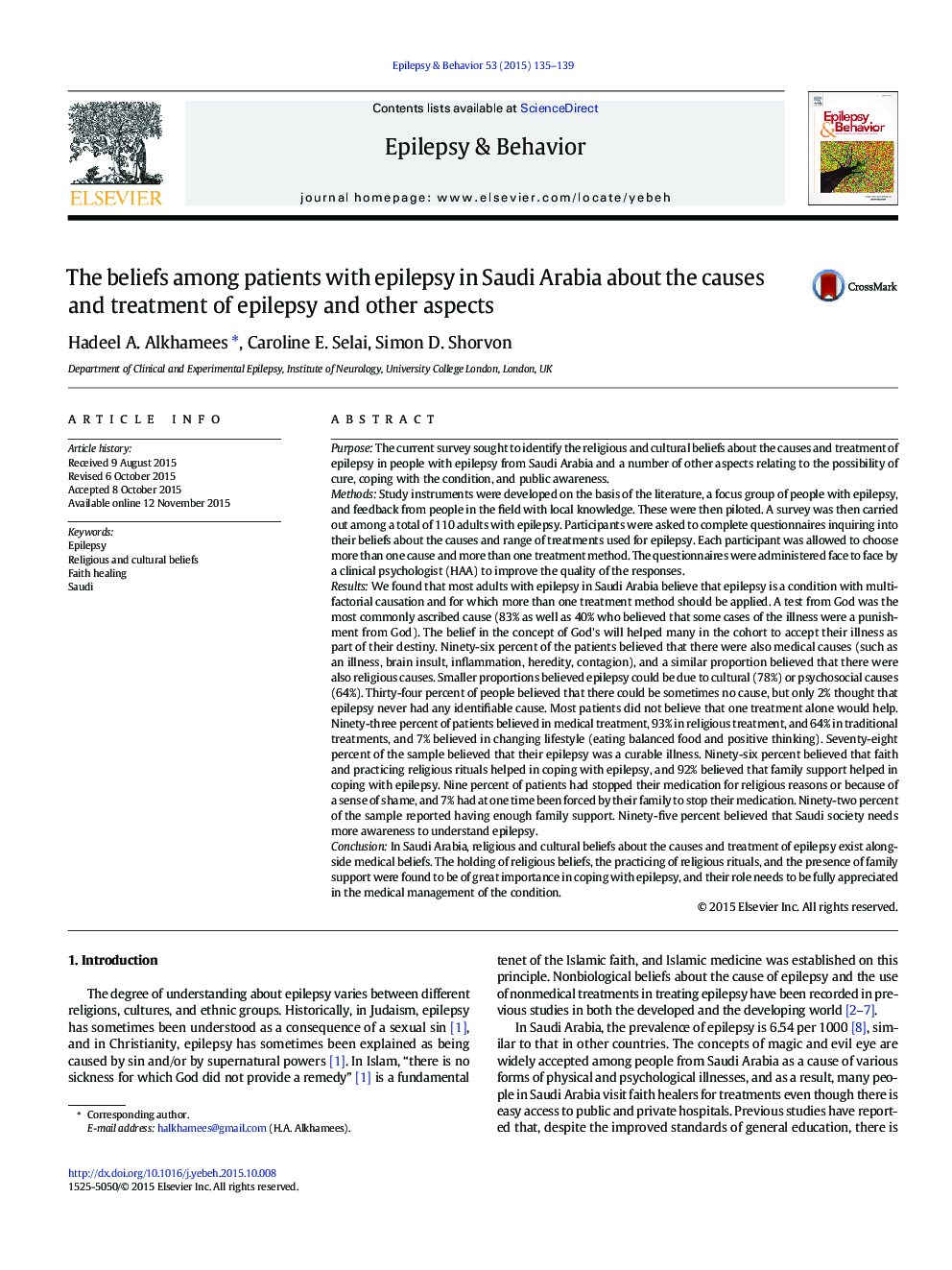| کد مقاله | کد نشریه | سال انتشار | مقاله انگلیسی | نسخه تمام متن |
|---|---|---|---|---|
| 6010321 | 1579837 | 2015 | 5 صفحه PDF | دانلود رایگان |
- People with epilepsy from Saudi Arabia hold a number of beliefs about the causes and treatment of epilepsy
- Beliefs about epilepsy are both related to medical knowledge and stem from deeply held religious beliefs
- Most people from Saudi Arabia believe that epilepsy is a curable illness
- Coping mechanisms used by most people with epilepsy from Saudi Arabia include prayers and other religious rituals
- Family plays an important positive role in the life of a person with epilepsy in Saudi Arabia
PurposeThe current survey sought to identify the religious and cultural beliefs about the causes and treatment of epilepsy in people with epilepsy from Saudi Arabia and a number of other aspects relating to the possibility of cure, coping with the condition, and public awareness.MethodsStudy instruments were developed on the basis of the literature, a focus group of people with epilepsy, and feedback from people in the field with local knowledge. These were then piloted. A survey was then carried out among a total of 110 adults with epilepsy. Participants were asked to complete questionnaires inquiring into their beliefs about the causes and range of treatments used for epilepsy. Each participant was allowed to choose more than one cause and more than one treatment method. The questionnaires were administered face to face by a clinical psychologist (HAA) to improve the quality of the responses.ResultsWe found that most adults with epilepsy in Saudi Arabia believe that epilepsy is a condition with multifactorial causation and for which more than one treatment method should be applied. A test from God was the most commonly ascribed cause (83% as well as 40% who believed that some cases of the illness were a punishment from God). The belief in the concept of God's will helped many in the cohort to accept their illness as part of their destiny. Ninety-six percent of the patients believed that there were also medical causes (such as an illness, brain insult, inflammation, heredity, contagion), and a similar proportion believed that there were also religious causes. Smaller proportions believed epilepsy could be due to cultural (78%) or psychosocial causes (64%). Thirty-four percent of people believed that there could be sometimes no cause, but only 2% thought that epilepsy never had any identifiable cause. Most patients did not believe that one treatment alone would help. Ninety-three percent of patients believed in medical treatment, 93% in religious treatment, and 64% in traditional treatments, and 7% believed in changing lifestyle (eating balanced food and positive thinking). Seventy-eight percent of the sample believed that their epilepsy was a curable illness. Ninety-six percent believed that faith and practicing religious rituals helped in coping with epilepsy, and 92% believed that family support helped in coping with epilepsy. Nine percent of patients had stopped their medication for religious reasons or because of a sense of shame, and 7% had at one time been forced by their family to stop their medication. Ninety-two percent of the sample reported having enough family support. Ninety-five percent believed that Saudi society needs more awareness to understand epilepsy.ConclusionIn Saudi Arabia, religious and cultural beliefs about the causes and treatment of epilepsy exist alongside medical beliefs. The holding of religious beliefs, the practicing of religious rituals, and the presence of family support were found to be of great importance in coping with epilepsy, and their role needs to be fully appreciated in the medical management of the condition.
Journal: Epilepsy & Behavior - Volume 53, December 2015, Pages 135-139
